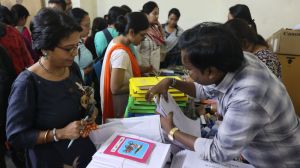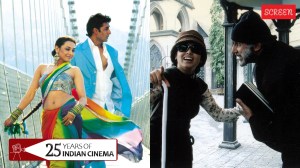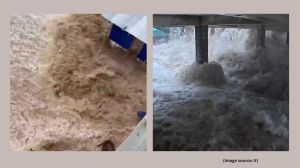Rao leaves PCs, papers, and some questions
Lying locked in a room in a house at 9, Motilal Nehru Marg, in the capital are two personal computers, several floppy disks and CDs, a colle...

Lying locked in a room in a house at 9, Motilal Nehru Marg, in the capital are two personal computers, several floppy disks and CDs, a collection of books and what are considered ‘‘sensitive’’ papers. These are what former Prime Minister P V Narasimha Rao left behind and are now at the centre of a controversy over what to do with them.
These include the two books he had written, one of them being his ‘‘version’’ of the story of the Babri Masjid demolition and the other, the unfinished sequel to his book Insider.
Rao’s children have meanwhile sought an appointment with Prime Minister Manmohan Singh to convert the Motilal Nehru Marg house, where Rao lived for many years, into a memorial.
Some Rao associates feel his personal papers are national property. One of them is Bhuvnesh Chaturvedi, who was Minister of State, PMO, during Rao’s premiership, and remained close to him until his death.
‘‘There is nothing personal or private about a public figure,’’ Chaturvedi told The Indian Express. ‘‘Besides, these papers may contain sensitive information, which could have a bearing on national interest and security, and could even lead to international implications. His papers should not be viewed as the private property of his successors.”
Chaturvedi suggests the Government set up a P V Narasimha Rao Memorial Trust which then receives all documents and Rao’s writings before deciding on what to publish and what is ‘‘too sensitive’’ a subject.
‘‘While the public has a right to Rao’s thinking, we need to be cautious about information that could have a bearing on security,’’ he said.
As for other late PMs, Nehru’s papers were in the custody of a trust which was headed by a member of the family, but these were private papers. In the case of Lal Bahadur Shastri, his private papers, that is letters he wrote, came to his wife Lalita Shastri who got them published. ‘‘But papers which had anything to do with the Government,’’ said son Sunil Shastri, ‘‘went back to the Government.”
Rao’s family is ambivalent on the subject. ‘‘My father belongs to the nation,’’ said son Prabhakar Rao, who is currently in the capital. When asked about his papers and the content on the PCs, he said: ‘‘I will have to discuss with the other members of the family what they want.’’
‘‘We are in the process of packing his things, and are taking stock of the situation,’’ said Prabhakar Rao. ‘‘My father’s books and papers need to be categorised and we need to look at the stock of floppies and CDs to decide what should be published. Of course, my interest is that his writings should be read by as many people as possible. But we will have to sit down with the rest of the family and come to a decision.’’
The family, he said, had been touring with Rao’s ashes and he had just returned to the capital after a visit to Kashi and Prayag.
Prabhakar Rao said the family wanted 9, Motilal Nehru Marg to be converted into a memorial for Rao. ‘‘I have asked to see the PM to discuss this. We really have all our memories of him here but we don’t know what the government is thinking or what are the possibilities or restrictions.’’
Chaturvedi said the government should take a clear decision on the matter for there are five former PMs alive today. Chaturvedi recalled that after V K Krishna Menon’s death, his private secretary had taken away some of Menon’s papers. Indira Gandhi had, however, moved in to ensure that the papers were handed over to the Nehru Memorial Library.
Rao was privy to a wealth of sensitive information. He had prepared to conduct a nuclear explosion in December 1995—in fact, after his death Atal Bihari Vajpayee called him the architect of the tests that his NDA government conducted in May 1998. Rao wa s also Home Minister during Operation Bluestar and the 1984 anti-Sikh riots.
Photos



- 01
- 02
- 03
- 04
- 05




























